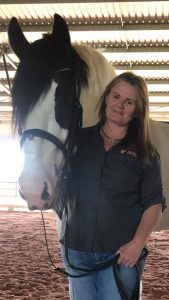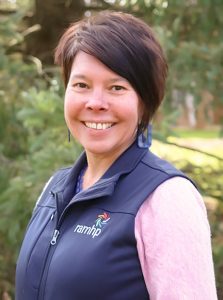Most of us can probably identify a person in the community who always steps up to help out. They might organise a local gathering to talk about something impacting your town or pull their sleeves up for a community working bee. It can be a very rewarding experience to be involved in local community initiatives, but it can also be personally draining. So, how can we help the helpers? In this episode you’ll hear about why community participation is crucial in creating healthy communities, how you can help support those ‘champions’ within your community and what you can do to keep mentally well and combat compassion fatigue.
Guest Speakers

Angela Kane is from the community of Cobargo which was terribly devastated by the Black Summer Bushfires of 2019-20. Six months on from the fires and Angela was integral to the organisation of the ‘Women In Industry On The Land’ brunch in Cobargo, where local women shared stories and spoke about mental health supports available in the region. Angela is a shining example of the difference one person can make to the health and wellbeing of their communities.
 Jennie Keioskie has a degree in psychology and a postgraduate degree in social work and has worked in mental health and wellbeing for over 20 years. Being a country girl at heart, Jennie has always lived and worked in rural Australia and has a passion for bringing high-quality services to those who live outside the major metropolitan and regional areas.
Jennie Keioskie has a degree in psychology and a postgraduate degree in social work and has worked in mental health and wellbeing for over 20 years. Being a country girl at heart, Jennie has always lived and worked in rural Australia and has a passion for bringing high-quality services to those who live outside the major metropolitan and regional areas.
Jennie has been on the RAMHP team since early 2010 and believes the success of the program is its ability to build on and support many of the strengths that are inherent in rural communities such as community connectedness and innovative and creative problem solving.
Background
Whether you’re a community volunteer or work professionally in caring professions such as nursing, social work, psychology or are a first responder, chances are you’re a pretty compassionate person who wants to help others.
But looking after or helping individuals or communities in need can take its toll on even the kindest, most caring amongst us and deplete our compassion reserves. Psychologists call this ‘compassion fatigue’, a state of exhaustion as a result of prolonged exposure to compassion stress. [1]
Because those caring for and helping others can be vulnerable to fatigue and burn-out, it’s important that we can identify when one of our ‘helpers’ is becoming fatigued and offer them support and a helping hand where we can.
Psychological symptoms of compassion fatigue include a reduced ability to feel empathy towards others, mood swings, irritability and being over-sensitive. Compassion fatigue can also elicit physical symptoms like headaches, sleep disturbances and fatigue. [1]
Resources
Carer Gateway – 1800 422 737
Carer Gateway helps carers. If you care for a family member or friend, then Carer Gateway could help you.
Carer Gateway have phone counselling, available 5 days a week from 8am to 6pm on 1800 422 737. They also provide an online carer forum, and self-guided coaching and skills courses to give you support, skills and information.
Carer Gateway:
- provides practical information and advice
- helps you to get the services and support you need
- provides free counselling services over the phone
- provides free coaching to help you in your role
- lets you connect with other carers through a community forum
CRANAplus Bush Support Services – 1800 805 391
The challenges that face remote health workers in their day to day lives (both at work and just by living remotely) are different than those living with the support found in larger regional and urban areas. CRANAplus’ Bush Support Services recognises this and offers unique and helpful resources that draw on its vast network and specialised knowledge. CRANAplus sees Bush Support Services as vital in retaining a healthy and resilient workforce in the remote sector and makes health worker support a priority.
Through Bush Support Services, CRANAplus is able to provide 24/7 personalised care for remote health workers and their families.
You don’t have to be a member to utilise this service.
CANAplus qualified psychologists are experienced in the remote sector and know first-hand, the best resources for those with unique support needs. They have an understanding that the particular mental health of both Indigenous and non-Indigenous remote health workers is a result of the unique nature of remote work.
It’s free and it’s confidential. You can also remain anonymous at all times, if you wish. Calls from mobile phones to the Bush Support Services 1800 805 391. Toll Free Number can be returned at the caller’s request.
This Way Up provides step-by-step strategies for managing stress, anxiety and low mood.
Their range of tailored online courses are designed to teach you proven psychological skills to transform your thoughts, feelings, and behaviours so you can make a positive change in your life.
This Way Up is run by clinical psychologists, psychiatrists, researchers, and web technicians based at the Clinical Research Unit for Anxiety and Depression (CRUfAD) – a joint facility of St Vincent’s Hospital and the University of New South Wales.
Help Services
If you or someone else is in immediate danger, call 000 or go to your nearest hospital emergency department.
If you’re concerned about your own or someone else’s mental health, you can call the NSW Mental Health Line 1800 011 511 for advice.
Having a tough time and need someone to talk to right now? The following services are there to listen and help you out. They are confidential and available 24/7.
- Lifeline – 13 11 14
- Suicide Call Back Service– 1300 659 467
- MensLine– 1300 78 99 78
- Kids Help Line (for young people aged 5 to 25)– 1800 55 1800
- Domestic Violence Line – 1800 656 463
- 1800 RESPECT – 1800 737 732
- Alcohol and Drug Information Service – 1800 250 015
